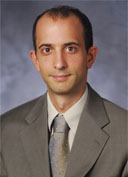 Tuesday, October 11, 2011
Tuesday, October 11, 2011
4:00 – 5:00 pm
1504 GG Brown
The Department of Mechanical Engineering Seminar for Tuesday, October 11, features Karim Sabra. Karim Sabra is currently an Assistant Professor of Mechanical Engineering at the Georgia Institute of Technology. Prof. Sabra joined the Georgia Institute of Technology in July 2007. Prior to this he was a Project Scientist (for 2 years) and Postdoctoral researcher (for 2 years) at the Marine Physical Laboratory of the Scripps Institute of Oceanography at the University of California at San Diego. Prof. Sabra graduated with his PhD in Mechanical Engineering in 2003 from the University of Michigan at Ann Arbor. Prof. Sabra teaches and performs research on acoustic and elastic wave propagation. Dr. Sabra is a Fellow of the Acoustical Society of America and the recipient of the 2009 A.B. Wood medal from the Institute of Acoustics (UK) for his significant contributions to the field of underwater acoustics as well as the 2011 R.B. Lindsay award from the Acoustical Society of America for significant contribution to time-reversal and ambient noise correlations. He will discuss “Using Ambient Noise for Passive Sensing and Imaging.”
Abstract: The random nature of ambient noise tends to suggest limited utility: ambient noise is commonly considered to be a nuisance for sensing or imaging applications. This presentation will show that whether noise is a nuisance or a useful signal actually depends on how it’s processed. Indeed, acoustic fields from random sources are often considered to be incoherent, but there is some coherence between two sensors that receive signals from the same individual noise source. Consequently, by crosscorrelating the ambient noise recorded at two sensors one can estimate the elastic or acoustic waves that propagate between them (i.e. corresponding to the Green’s function or impulse response between those sensors). Cross-correlation is a statistical measure of the recorded noise waveforms at different point in space as a function of the time-lag applied to one of them. This approach provides a foundation for sensing and imaging techniques using only ambient noise, thus without active transmitters. We will examine the background physics of extracting coherent information from ambient noise. Further we will present experimental results in various research area-including ultrasonics, structural-health monitoring, underwater acoustics and seismology- confirming these theoretical arguments.
For more information on future department seminars, visit the ME Seminar Series page.